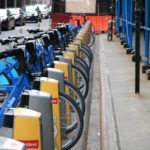 One of the most enduring changes in urban transportation in recent years has been the huge growth in shared bicycles that adorn (or litter) our streets. What was once the preserve of tourists looking to get around found an ideal market in the cycle couriers that fulfill our every desire.
One of the most enduring changes in urban transportation in recent years has been the huge growth in shared bicycles that adorn (or litter) our streets. What was once the preserve of tourists looking to get around found an ideal market in the cycle couriers that fulfill our every desire.
The technology enabled what was a market dominated by publicly-run schemes to be large enough for a number of private entrants. Research from Penn shows how this has enabled bike sharing to grow out of the upper-class neighborhoods within which it took root and has now become a major player in lower-income communities.
Growing usage
The research examined how bike-share services were used before and after the Covid lockdowns. It found that the average length of usage increased in Philadelphia across all socioeconomic backgrounds.
The analysis relied on data from Indego, which powers bike-sharing in the city. The researchers calculated the average duration of bike trips in 17 planning districts across the city, with the location of each trip used as a proxy for the socioeconomic status of the rider.
The analysis found that the duration of trips rose during the pandemic from 7 minutes to 12 minutes on average. What’s more, this increase was consistent across the planning districts, suggesting that the bike-share programs were a reliable substitute for public transportation.
“Transportation is more than just getting from point A to point B,” the authors explain. “It’s about accessing school, accessing jobs, and maintaining a consistent lifestyle.”
They hope that their findings will help both city planners and bike-share operators alike as they work to build a more effective urban transport infrastructure. Indeed, they argue that using historic mobility data can merely perpetuate the biases already present in transportation systems, and that instead an expansion of bike-share services in lower-income areas could be hugely beneficial.
“This system has an enormous amount of potential to make a lot of people’s lives a lot better,” they conclude.